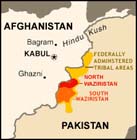Afghan-Pakistan tribal assembly opens talks on Taliban violence
 Islamabad - A meeting of Pakistani and Afghan political and tribal leaders started on Monday against the backdrop of the recent strategy shift by the US allies to bring peace to Afghanistan through dialogue with the Taliban militants.
Islamabad - A meeting of Pakistani and Afghan political and tribal leaders started on Monday against the backdrop of the recent strategy shift by the US allies to bring peace to Afghanistan through dialogue with the Taliban militants.
"We must not shut the doors of negotiations to those sons of the soil willing to forsake the path of violence. With a patient ear we must listen to them and let them be heard," said Pakistani Foreign Minister Shah Mahmood Qureshi as he opened the talks in Islamabad.
Abdullah Abdullah, a former Afghan foreign minister, and Owais Ghani, governor of Pakistan's North-West Frontier Province, are leading the two 20-person-strong delegations participating in the two-day "jirga," or tribal assembly).
It is a follow-up to the August 2007 grand assembly held in Kabul which sought a conciliatory approach to tackle militant violence in Afghanistan and the restive Pashtun regions straddling the border.
Afghan Foreign Minister Rangin Dadfar Spanta last week confirmed that his government recently held talks with a Taliban representative in Saudi Arabia, but stressed that the process would only continue if the militants renounced violence and embrace the Afghan constitution.
But the Taliban, in a statement posted on their website, said peace talks could not take place unless the foreign troops pull out of Afghanistan.
Qureshi said there was a growing realization that use of military means alone could not bring the desired results in the fight against terrorism in Afghanistan.
"The wrongs and neglects of the past must be corrected. Political, economic and social reforms must proceed hand in hand," he added.
According to the minister, Afghanistan and Pakistan continue to suffer immensely from extremism, militancy and terrorism, which he described as "the gravest threat to both countries."
"Pakistan and Afghanistan, therefore, need to cooperate closely to effectively counter and completely eliminate this curse," Qureshi noted.
Many analysts say they expect little to come out of the Islamabad meeting, because the Taliban are not represented.
Relations between Afghanistan and Pakistan have seen a downward slide in recent months in the face of cross-border raids on US-led international troops and the Afghan army by al-Qaeda and Taliban militants hiding in Pakistan's north-western tribal region.
A serious rift in the ties came after the July 7 suicide car attack on the Indian embassy in Kabul that killed at least 44 people, including Indian Defence Attache Brigadier R Mehta and political counselor V Venkat Rao.
Kabul and New Delhi repeatedly blamed Pakistan's Inter-Services Intelligence secret service for the bombing, but Islamabad denied the accusation.
"Both Afghanistan and Pakistan need peace, both need a healing touch ... peace will lead to prosperity," Qureshi said in Islamabad. (dpa)